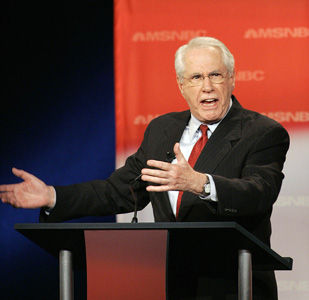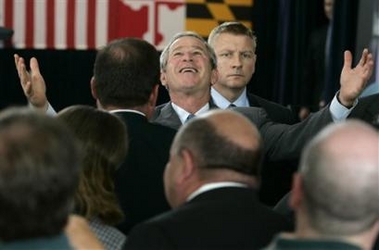Or does he? Has Rep. Paul Kanjorski ever known a day without a hot meal? Or a day in which he had to scrape together change from under the sofa to buy groceries so that he could feed his family? Has he ever fallen behind on rent? Utilities? The electric bill? You see, those are the facts that millions of Main Street Americans — many of them recently unemployed — are now living. Or is Kanjorski one of those types who believes that one cannot live in New York City on less than $500K a year? Rep. Kanjorski’s claim in the above clip — that the world economy would have collapsed within 24 hours had not guarantee money been granted to banks — is, to say the least, highly suspect and deserves careful and detailed scrutiny by economists. Like the supply-side schemes of the past, the money has not trickled down. And if the Democrats cannot produce tangible evidence that it will trickle down, then they must be called on the carpet. Assuming that the carpet does not fray up before a reasonable answer.
Tag / Politics

The Bat Segundo Show: Robert G. Kaiser
Robert G. Kaiser recently appeared on The Bat Segundo Show #264.
Robert G. Kaiser has worked at the Washington Post since 1963. He is most recently the author of So Damn Much Money: The Triumph of Lobbying and the Corrosion of American Government.
Condition of Mr. Segundo: Still waiting for the lobbyists to work out a deal with him.
Author: Robert G. Kaiser
Subjects Discussed: Obama’s first executive order, revolving door bans, Tom Daschle’s recent troubles, “exceptions in extraordinary circumstances,” candidates for office with lobbying backgrounds, Gerald Cassidy, picking a character for a Washington narrative, the birth of the lobbying firm Schlossberg-Cassidy Associates, the Bankruptcy Abuse Prevention and Consumer Protection Act of 2005, Cassidy falling into second place, lobbying problems and the 1994 Republican Revolution, the K Street Project, lobbying and partisan politics, Cassidy’s lobbying style vs. Abramoff’s lobbying style, Tom DeLay, safe seats, John Lewis, Richard Lugar, Chuck Schumer, the likelihood of an equitable earmarking system, Columbia’s early lobbying efforts with the chemistry lab, peer review, attempting to sort out differing accounts concerning the Tufts Nutrition Center, Jean Meyer, Edward Bernays and why his influential essay, “The Engineering of Consent,” took a few decades to catch on in Capitol Hill, Joe McGinnis’s The Selling of the President, Roger Ailes, the abandonment of objective reality over the past 45 years, the Jim Wright ethics investigation and whether or not Cassidy was culpable in Wright’s downfall, Newt Gingrich’s rise, and the potential for a return to the comparatively virtuous pre-Nixon Congress.
EXCERPT FROM SHOW:
 Correspondent: You also bring up one moment in the book, where you depict Senator John Stennis — the man, of course, who wrote one of the first Senate ethics codes; in fact, the first Senate ethics code. And who had not raised more than $5,000 for all of his campaigns in the past. Now here he is up for reelection in 1982. And he needs to raise $2 million. He is now forced to accept this devil’s bargain. This leads me to wonder whether, in fact, there is even room for a Sam Rayburn type of Congressman anymore. Whether it’s even possible for someone of any ethical core to be in this deeply ingrained system. If John Stennis can’t do it, then who can?
Correspondent: You also bring up one moment in the book, where you depict Senator John Stennis — the man, of course, who wrote one of the first Senate ethics codes; in fact, the first Senate ethics code. And who had not raised more than $5,000 for all of his campaigns in the past. Now here he is up for reelection in 1982. And he needs to raise $2 million. He is now forced to accept this devil’s bargain. This leads me to wonder whether, in fact, there is even room for a Sam Rayburn type of Congressman anymore. Whether it’s even possible for someone of any ethical core to be in this deeply ingrained system. If John Stennis can’t do it, then who can?
Kaiser: Well, it’s one of my favorite stories in the book. I’m glad you noticed it. But all these things are complicated. For example, in today’s Congress, in the House, we have 435 members. Probably 200 of them — or even 220 — are in totally safe seats. That is to say, they can win reelection without campaigning at all probably. Or very minimally. And that’s because of the impact of, now, two generations of very aggressive gerrymandering. We call it redrawing of the districts and state legislatures every ten years after the census is done, in which both parties have accepted the same rule of thumb that the ideal outcome is to maximize the number of safe seats for our side and minimize them for the other side. You remember this episode in Texas, which actually lead to DeLay’s downfall, when he overplayed his hand on this subject and got the Texas legislature as soon as it was under Republican control to add four more Republican seats from Texas. Which he got away with initially. But he eventually got indicted for it. And that, I think, was the beginning of the end for DeLay.
Anyhow, there are opportunities because of these safe seats for people who don’t raise any money. And they don’t participate in the corrupt system at all. Which is an interesting footnote. It just means that a large portion of members are exempt from the usual pains and tribulations of trying to raise all this money. Not true in the Senate, where everybody is theoretically more vulnerable in a way. They all try and raise the dough.
Correspondent: But if there are so many safe seats, is it possible that there could be some sort of Sam Rayburn type in a safe seat? Someone who refuses to, of course, accept any money. Pays his own way, as Rayburn did.
Kaiser: John Lewis of Atlanta. The great leader of the civil rights movement and fascinating figure, who I know slightly. I heard him preach on Sunday before the inauguration in a black church in Washington, which I just went to by chance. I didn’t realize he was going to be preaching there. He gave a remarkable presentation. But John Lewis has a very safe seat in parts of Atlanta. He’s a revered figure. I have no idea how much he raises for his elections. I should probably check that out. But Lewis is a good example of a distinguished citizen in Congress who is not corrupted by this system, as far as I know. And there are people who build up a kind of invincible status. Richard Lugar of Indiana would be a really good example of this. Lugar: former mayor of Indianapolis, Rhodes Scholar, good citizen. Conservative Republican. Nixon Republican originally when he came to town in the 70s. Lugar wins reelection, as he did this time, by huge majorities and doesn’t have to do any bad stuff, I don’t think, to raise money. There are a number of such figures who could fulfill your definition, I think, of a Sam Rayburn-like independent man. But they are the exceptions certainly.
BSS #264: Robert G. Kaiser (Download MP3)
Is the African-American/Prop 8 Exit Poll Connection Viable?
There are lies, damned lies, and exit polls. A purported connection between race and homophobia has recently made the rounds, prompting big think pieces from the likes of the Washington Post. We’ve been told that 7 out of 10 African-Americans who went to the California polls voted yes on Proposition 8 — a measure that passed on Tuesday overruling the California Supreme Court judgment that legalized same-sex marriage.
Even more amazing than this is the way this correlation is getting a free pass. The only way you can bring a demographic into election statistics is through the exit poll. But exit polls have problems. Back in 2006, Mark Blumenthal initiated a helpful series of posts summarizing some of the flaws: where the interviewer is standing in relation to the polling place, how well-trained the interviewer is, the tendency for voters who volunteer to participate upon seeing the interviewer with the clipboard, the inclination for the polls to favor Democrats in presidential election since 1988, and so forth. In 2005, the Washington Post reported that interviewing for the 2004 exit polls was “the most inaccurate of any in the past five presidential elections.” Large numbers of Republicans refused to talk with interviewers, and this, in turn, led to an inflated estimate for John Kerry. But despite these problems, exit poll faith is a bit like stubborn fabric softener sticking to a hard wonk’s argyle sweater. In a longass Rolling Stone article, even Robert F. Kennedy, Jr. believed in the gospel, suggesting that exit polling was the first indicator that the 2004 election had been stolen. Political slickster Dick Morris went further, stating that “exit polls are almost never wrong.”
Edison Media Research and Mitofsky International were the team behind the 2004 polling botch, and this dynamic duo also spearheaded this week’s California exit polling. The hard data is not yet available at the Edison/Mitofsky site. But the Associated Press has reported that 2,240 California voters (of these, 765 were absentees interviewed by landline telephone), interviewed in 30 precincts, represented the total number of people that Edison/Mitofsky interviewed. Which means that some percentage of these voters were African-American. Let’s give Edison/Mitofsky 50%. That leaves us with a mere 1,120 voters.
A quick jaunt to the California Secretary of State’s website reveals that there are 25,423 precincts in California and that 10.5 million people turned out on Tuesday. In other words, Edison/Mitofsky is making a major claim based on 0.11% (a little more than one-tenth of 1%) of the total precincts, and a sample of voters smaller than a crab louse dancing in a thorny thatch of hair. Is this really large enough? Exit polls have proved somewhat accurate in relation to simple binary choices, but I’m wondering if it all turns to bunk when it comes to correlation. Perhaps a legion of statistics experts can help explain why Edison/Mitofsky can get away with this. Because I’m tempted to view this as a strange offshoot of the Bradley effect.

The Bat Segundo Show: David Rees
Just in time for Election Day! David Rees appeared on The Bat Segundo Show #248. Rees is most recently the author of Get Your War On: The Definitive Account of the War on Terror: 2001-2008.
Condition of Mr. Segundo: Struggling to cast his vote.
Author: David Rees
Subjects Discussed: [List forthcoming]
EXCERPT FROM SHOW:
 Correspondent: I wanted to also ask about the use of white space, and often the lack of white space, with some of the panels that have this extraordinarily long rant that one of the characters is conducting versus using the clip art and shifting it to the right hard edge of the panel or the left hard edge of the panel, or what not. What is your criteria in terms of white space and filling up the panel? Is it contingent upon the words you have to deliver for any particular strip?
Correspondent: I wanted to also ask about the use of white space, and often the lack of white space, with some of the panels that have this extraordinarily long rant that one of the characters is conducting versus using the clip art and shifting it to the right hard edge of the panel or the left hard edge of the panel, or what not. What is your criteria in terms of white space and filling up the panel? Is it contingent upon the words you have to deliver for any particular strip?
Rees: You probably don’t know this, but the U.S. government allots all political cartoonists a given amount of white space in a year, and a lot of budgetary issues. If you don’t use your white space in a year, you don’t get it back the following year. There’s no rollover white space.
Correspondent: Yeah, yeah, it’s the appropriations and the earmarks I’ve heard.
Rees: So you have to really challenge yourself every year to use just enough white space, so that they’ll give you more white space next year. You have to submit this form. A white space form. Form JKL-202. And you submit this form. And they will give you more white space. And so as a political cartoonist — I mean, if you’re registered with the government, which I am, which all political cartoonists are supposed to be, if you find yourself at the end of the year that you haven’t used enough white space, then you go on a big rant. So there isn’t much white space around. You know what I mean?
Correspondent: Sure. Sure.
Rees: Because you don’t want to go over your limit immediately. Because you’ll be penalized.
Correspondent: But with all the “fucks” within the rant, that can be very problematic. I know you’ve gotten into trouble based off of that. Because of the specific requirements of this act.
Rees: Right. You’re referring to the Left Wing Political Cartoonists Profanity Allotment Act of 2003?
Correspondent: Yeah, yeah, I am. The number of “fucks” are quite frenetic. Exactly.
Rees: Well, I trade on the gray market. I trade — you know, cap and trade with carbon emissions? They set up the same thing for cartoonists, where you get a given amount of profanity. Fuck, goddam, asshole, shit, cocksucker, bitch, all that stuff. And then if you want to use more, you buy a set on the International Profanity Market. You buy a certain amount from other cartoonists.
Correspondent: They come in 200 units, I think.
Rees: Right. Well, it’s 200 syllables. You don’t actually buy the profanity by the word. You buy it by the syllable. So “motherfucker” is four syllables. You can use those four syllables to deploy one “motherfucker” or four “asses.” So I usually just buy them from cartoonists like Bil Keane, who does The Family Circus. He never uses his allotment. In a year, he never says “fuck” in The Family Circus more than ten times. So I will buy him out usually at the beginning of the year, so that I have enough to get me through a season.
BSS #248: David Rees (Download MP3)
The Bat Segundo Show: Sen. Mike Gravel & Joe Lauria
Senator Mike Gravel and Joe Lauria appeared on The Bat Segundo Show #224. Gravel and Lauria are the co-authors of A Political Odyssey. Gravel was a candidate for the 2008 U.S. presidential race. Lauria is an investigative journalist who writes for The Sunday Times.
Condition of the Show: Delving into the complexities of the military industrial complex.
Authors: Senator Mike Gravel and Joe Lauria.
Subjects Discussed: Whether Sen. Gravel and Joe Lauria share the same brain, The National Initiative for Democracy, Article VII of the Constitution, rules that prevent people from participating in the electoral process, the military industrial complex, the Civil War and the defense budget, Eisenhower’s transportation system, Harry Truman and Communists, Iran’s missile defense, living in a culture of fear and a culture of information, X-ray machines at airports, Gravel’s involvement in the celebrity culture of politics, “Rock,” involvement with Obama Girl, whether or not Senator Obama or any of the Democratic presidential candidates have been in touch with Gravel since the debates, whether or not Gravel is done with electoral politics, leaving out details of Gravel’s life between 1981-2006 in A Political Odyssey, political visibility, balancing substance and celebrity, the semiotics and audience reaction to “Rock,” the “unnecessary” nature of war, Woodrow Wilson, war as an endless continuum, whether or not Americans deserve the government that currently represents them, Colin Powell and false threats, Daniel Ellsberg, Dick Durbin, Frank Wuterich and Murtha’s defamation suit, the Speech or Debate Clause, morality and collateral damage, Scoop Jackson, Gravel standing up against the ABM, working with hawkish Senators, and political peer pressure.
EXCERPT FROM SHOW:
 Correspondent: A question to both of you. The modifier that frequently ripples, so to speak, throughout this book in relation to war is “unnecessary.” You question Woodrow Wilson’s motives for getting us into World War I, writing that America was not threatened. Yet I must bring up the bombing of the Lusitania. And I must also point out that there was the Kingsland Explosion. The Zimmerman telegram. I mean, what is a necessary war? Was America really not at threat in World War I? Is this what you’re saying?
Correspondent: A question to both of you. The modifier that frequently ripples, so to speak, throughout this book in relation to war is “unnecessary.” You question Woodrow Wilson’s motives for getting us into World War I, writing that America was not threatened. Yet I must bring up the bombing of the Lusitania. And I must also point out that there was the Kingsland Explosion. The Zimmerman telegram. I mean, what is a necessary war? Was America really not at threat in World War I? Is this what you’re saying?
Gravel: Of course it was not.
Lauria: Well, I’ll just say briefly that the idea of the Zimmerman telegram was absolute nonsense. Why did Wilson send ships into the areas where they could be sunk?
Gravel: Right. And there was an argument that it had munitions. I mean, Woodrow Wilson didn’t have to go into the First World War at all. In fact, had he not gone in, there’s a chance that we never would have had the Second World War. Had we let them, that was their war, bleed themselves out. Well, you realize that after the First World War, the democracies of the world were in command of the world. And who screwed up the 20th century but the democracies? Clemenceau and the British and ourselves were the ones that set up the tobacco of the 20th century. Does it get any worse than that?
Correspondent: Okay, that clarifies…
Lauria: There wouldn’t have been Versailles. There wouldn’t have been a settlement to the war.
Gravel: There wouldn’t. Because…
Lauria: You would not have had Hitler.
Gravel: No, you wouldn’t have had Hitler. Because the Germans could not have refielded their armies that had left. The French could not have refielded their armies. So there would not have been Versailles. This was like the movie, The Last Man Standing. Well, the American troops! The British were not standing. The French were not standing. The Germans were not standing. So there we were. The Americans were standing. And we were the heroes. And old Woodrow Wilson was basking in this light. Woodrow Wilson was not the great President we made him out to be. Believe me, he was not.
Correspondent: I thank you for the clarification, but back to the other question. Is war necessary in any sense? Can you cite specific conflicts? Specific battles?
Gravel: I know of no war in history that did not beget more war.
Correspondent: But that kind of dodges the question very skillfully.
Gravel: No, that doesn’t dodge the question. I know of no war that has not begotten more war.
Correspondent: Is it necessary though?
Gravel: I don’t know if it’s necessary. I don’t know if it’s necessary. You attack me. I gotta kill you. Then your brother says, “Well, you killed me.” It’s the famous American cowboy story. You know, vengeance wreaks more vengeance. What kind of question is it? Maybe the question you ought to ask is to take the question from Jesus. Turn the other cheek and maybe you won’t get the other cheek lopped off.
Download BSS #224: Sen. Mike Gravel & Joe Lauria (MP3)
The Politics of Boasting
We don’t often look to electoral politics for sublime life lessons, yet sometimes the lessons are there. Rudy Giuliani and Mitt Romney, two popular Republican politicians, have dropped out of the 2008 presidential race. Both candidates exemplified an attitude that has been with us forever but seems to have a peculiar hold on our own time: the attitude of arrogance, or vain overconfidence. Perhaps voters wished to punish this attitude by refusing to vote for either man.
 Rudy Giuliani’s smug self-assurance had been legendary during his long career as District Attorney and Mayor in New York City. But he revealed a more off-putting overconfidence to voters with his strange decision to not compete in the earliest GOP Primaries. He calmly assured his followers that he would sweep up victory in Florida, incorrectly guessing that no other candidate would excite voters in the prior contests. This was a bad strategy in several ways, but it may have backfired for one particular reason above all: it reminded voters of George W. Bush and Donald Rumsfeld’s flippant assurances that they would easily sweep up victory in Afghanistan and Iraq. In 2008, overconfident leadership is the polar opposite of what Americans want.
Rudy Giuliani’s smug self-assurance had been legendary during his long career as District Attorney and Mayor in New York City. But he revealed a more off-putting overconfidence to voters with his strange decision to not compete in the earliest GOP Primaries. He calmly assured his followers that he would sweep up victory in Florida, incorrectly guessing that no other candidate would excite voters in the prior contests. This was a bad strategy in several ways, but it may have backfired for one particular reason above all: it reminded voters of George W. Bush and Donald Rumsfeld’s flippant assurances that they would easily sweep up victory in Afghanistan and Iraq. In 2008, overconfident leadership is the polar opposite of what Americans want.
Mitt Romney’s arrogance — a relaxed square-jawed perfection excavated from an earlier age — has always been different from Giuliani’s. Unlike John McCain and Mike Huckabee, Romney rarely revealed any personal frailty or flaw, betrayed few complex emotions, and was never caught agonizing over a decision. In other eras of American politics, this politician might have been highly valued for his Teflon sheen, but again in 2008 we’ve had enough of slick impenetrability. After eight years of “stuff happens” (from Katrina to Pakistan, and stuff is still happening), American voters may need a long recovery period before we’ll vote for a politician with a self-assured, unflappable personality again.
Maybe this is why Hillary Clinton’s biggest rebound moment occurred after she teared up before a TV audience, or why the naturally intense and earnest Barack Obama is catching on with voters. But arrogance hasn’t always been a detriment for a politician. When George W. Bush first emerged as a Presidential candidate a decade ago, his cool arrogance was considered his best feature. It made him “Reaganesque.” Ronald Reagan’s easygoing charm was always rooted in a stern and unshakable confidence that people yearned to find again, and this was no small factor in the emergence of another ex-President’s wayward Texan son as a conservative politician. When the younger George W. Bush’s advisors, pollsters, and image makers assembled him in the laboratory, they marveled at the creature’s unflappable self-certainty.
 George W. Bush was constantly referred to as “Reaganesque” in his earlier years, though this image seems so far away now that we easily forget it. It turned out that President George W. Bush did not have the leadership skills of President Ronald Reagan. Just the arrogance.
George W. Bush was constantly referred to as “Reaganesque” in his earlier years, though this image seems so far away now that we easily forget it. It turned out that President George W. Bush did not have the leadership skills of President Ronald Reagan. Just the arrogance.
Of course, U.S. Presidents have been arrogant since the imperious George Washington, who demanded that his subjects kneel. There were perhaps none more blustery than the remarkable Theodore Roosevelt, whose effusive self-confidence is still fondly remembered today. Richard Nixon always presented a face of somber self-righteousness to the public, and a much deeper and insidious arrogance was revealed on the White House Tapes released during the Watergate affair. Jimmy Carter’s inability to rally his government behind his leadership appears to have been rooted in a principled rigidity. It’s probably the case that more US Presidents have been deeply arrogant than not.
It’s a more troubling fact that the United States of America is constantly described as an arrogant nation by many who criticize it, from Noam Chomsky books to Al Qaeda videos to countless casual conversations among concerned citizens. This, again, is nothing new. It was our arrogant Pacific Rim policy that frustrated Japan into attacking Pearl Harbor in 1941, for instance. So, is the United States of America actually arrogant? And what exactly does it mean to say this?
ar • ro • gance: (noun) offensive display of superiority or self-importance; overbearing pride.
Whether this shoe fits or not cannot be easily decided, but it does seem easy to understand how various American policies in Asia, the Middle East, Central America, South America, Africa and Europe can be seen as arrogant. Other world powers like Russia, England, China, France and Germany carry on similar legacies, and more generally it’s clear that a natural belief in the superiority of one’s nation, one’s religion, one’s ethnic group, one’s class, or one’s gender is universal in every society on Earth. It’s hard to imagine any influential nation of any size that has not acted arrogantly towards its neighbors.
Arrogance is as common as the air we breathe. You can’t walk down the street without slamming into it, usually coming at you from several directions at once.
It’s a strange fact that arrogance is not one of the seven deadly sins, while pride is. Dictionary.com defines pride as something much more positive than arrogance:
pride (noun): A sense of one’s own proper dignity or value; self-respect.
So how can pride be a sin if arrogance is not? The seven deadly sins were developed by a number of early Christian writers. One version was endorsed (and thus codified) by Pope Gregory I in the sixth century. I wonder if this pope might have chosen pride over arrogance as one of the seven deadly sins because pride denotes a certain secretive self-regard, while arrogance does not. Pride is a private feeling, whereas arrogance is essentially public and relational. You can only be arrogant in relation to others, and by being arrogant you are being honest about your true feelings. Several of the deadly sins revolve around secrecy, but arrogance is an honest expression of what you believe.
In 2008, the United States of America seems to be reeling from a trauma of arrogant and incompetent leadership, and there’s no telling what ripple effects this trauma may eventually cause. But even if American voters are turning towards more down-to-earth candidates in 2008, it’s hard to imagine that human nature is being fundamentally changed. We were designed to be arrogant, and to admire arrogance in others. We can’t defeat arrogance and we can’t erase it; perhaps all we need to do is avoid being blinded by it in the future and we’ll be okay.
Hillary’s Tears, Our Tears
 Lorrie Moore’s naive essay on Hillary Clinton not only demonstrates the unspoken precept that skilled fiction writers are sometimes remarkably simplistic when they write about politics, but deploys the same scripted liberalism that every progressive is now expected to chant to peers in coffeehouses. The formula, it seems, boils down to this: Hillary Bad, Obama Good.
Lorrie Moore’s naive essay on Hillary Clinton not only demonstrates the unspoken precept that skilled fiction writers are sometimes remarkably simplistic when they write about politics, but deploys the same scripted liberalism that every progressive is now expected to chant to peers in coffeehouses. The formula, it seems, boils down to this: Hillary Bad, Obama Good.
Now I’m not exactly a Hillary lover. Clinton waffled from a 1993 universal health care plan which mandated all employers to provide health care for employees to her latest “universal” plan, which shifts the mandatory financial burden to individual citizens. But a proper universal health care program is single-payer, regulated by the government, and doesn’t abdicate the spoils to HMOs. Clinton is also the senator who received the most money from HMOs in the 2008 election cycle. (Obama was second.)
Like every good left-leaning American, I have been seduced by the seemingly limitless reserves of Obama’s charisma: his smooth handling of Bill O’Reilly’s arrogant attack dog antics, his adroit response to anti-abortion protesters, insert your magical Obama moment here.
The man is slick. Slicker than Bill Clinton. I firmly believe that he can be the next President. He looks good. Too good.
In comparing Obama with Clinton, Moore writes that “unlike her, he is original and of the moment. He embodies, at the deepest levels, the bringing together of separate worlds. The sexes have always lived together, but the races have not.”
 I wonder if Moore remains aware that, according to the U.S. Census Bureau, women earn 77 cents for every dollar their male counterparts make. (The disparity, incidentally, is better in Washington, DC, where women make 91 cents to the male dollar. This may explain why Capitol Hill remains somewhat out-of-touch on this issue. An Equal Rights Amendment may provide succor to these problems.) Or maybe Moore remains unaware that young women are earning degrees at a higher rate than men do.
I wonder if Moore remains aware that, according to the U.S. Census Bureau, women earn 77 cents for every dollar their male counterparts make. (The disparity, incidentally, is better in Washington, DC, where women make 91 cents to the male dollar. This may explain why Capitol Hill remains somewhat out-of-touch on this issue. An Equal Rights Amendment may provide succor to these problems.) Or maybe Moore remains unaware that young women are earning degrees at a higher rate than men do.
This certainly doesn’t reflect a case where the sexes “have always lived together.” Unless, of course, we’re talking garden-variety cohabitation. And while Obama may talk the talk, I fail to see how Obama’s legislation record brings together separate worlds in any way that is substantially different from Hillary Clinton. The oft bandied boast is that Obama was not Senator in 2002 and therefore unable to vote for the congressional resolution authorizing Bush to use force in Iraq. But what’s not to suggest that within this climate of fear, Obama wouldn’t have done so? (The record demonstrates that John Edwards also voted for it. Kucinich and Paul did not.)
The distinction then is predicated on retroactive speculation. Which is a bit like seriously considering the ridiculous question Bernard Shaw asked of Michael Dukakis during the 1984 Democratic presidential debates: “Governor, if Kitty Dukakis were raped and murdered, would you favor an irrevocable death penalty for the killer?” Kitty Dukakis was not raped and murdered. Obama was not Senator during 2002. Nonetheless, it is an American political tradition to rate presidential candidates according to what they may have done under certain circumstances, as opposed to a more reasonable survey of what they are likely to do based on their past records.
So ultimately the difference between Obama and Clinton comes down to charisma. To watch Obama in action is to experience the most pleasant and capable of political machines. He’ll jazz up a crowd in minutes and give them the fleeting sense that they can change the world. But who is the wizard behind the curtain? Progressives — including myself — were so eager to fixate upon Karl Rove, but why do we fail to apply the same standards to those who run Obama’s campaign?
Last week, Hillary Clinton welled up on camera and was roundly ridiculed. The question arose over whether this was sincere. Cruel YouTube parodies surfaced soon after. For some, the tears confirmed the inevitable. Here are some of the YouTube comments:
I really feel that Hillary Clinton is a worhless [sic] piece of shit.
i hate this woman
This bitch won because she got on national television with her fake crocodile tears in front of million of viewers.
Yea what a fucking cow. She should be making pizza.
This is a very EVIL fricken human being…She should be ashamed of herself! If she had any heart at all she would finally tell the truth!
Go and fuck Bill.. instead of cheating people
Hillary Clinton is a worthless piece of shit.
And so on.
This was not, however, a Muskie moment, even if an op-ed columnist like Newsweek‘s Karen Breslau was keen to dredge up the droplet that careened down Muskie’s cheek and sealed his political fate. Until the primary results dictate otherwise, Clinton is still very much in the game.
What was not factored in Breslau’s article was the double standard with regard to gender. I find myself being one of the few who remains suspicious about never seeing a gaffe from Obama. Real humans screw up. But presidential politics demands perfection or, as Bush’s two victories confirm, a guy you can drink a beer with.
The cult of personality remains so seductive that even adept writers like Moore offer this foolishness: “it is a little late in the day to become sentimental about a woman running for president. The political moment for feminine role models, arguably, has passed us by.”
On the contrary, the present political moment is very much about whether a president has the right to appear sentimental before the cameras, which in turn is very much predicated upon whether the candidate is a man or a woman. It does not matter what Hillary Clinton’s positions are. What matters most of all is whether or not the “bitch” or “the worthless piece of shit” fabricated her tears.
The question we should be asking is just why these gratuitous issues of telegenic interpretation are deflecting more pressing concerns, such as platforms and positions, and why even the best of us are happily swallowing the bait.
